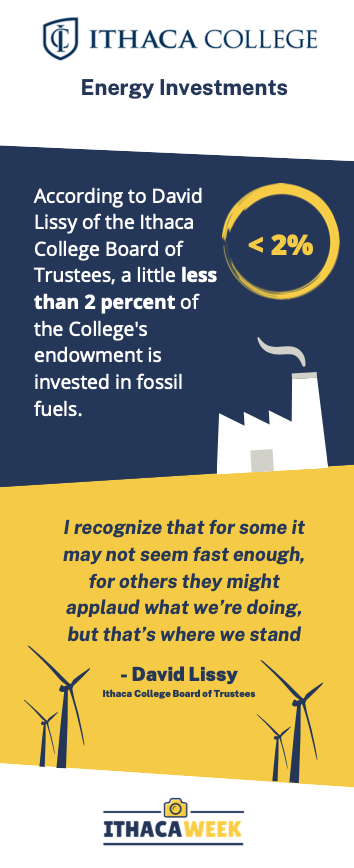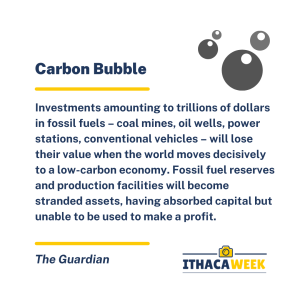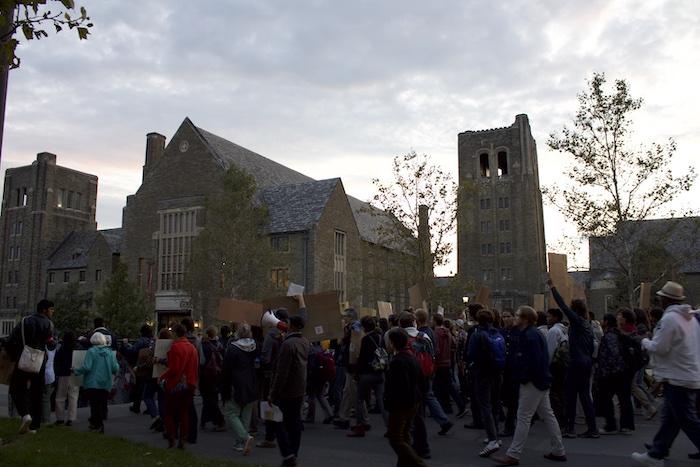For years, divestment advocates have been calling upon Ithaca’s premier institutions—Cornell University and Ithaca College—to withdraw endowment investments in the oil and gas industry. And while there has been ample progress on this front, these institutions have yet to fully divest from fossil fuels.

The Cornell University Board of Trustees voted to place a “moratorium” on fossil fuel investments in May 2020. The Board’s decision means that Cornell University will be ending all of its investments in the oil and gas industry by 2027 at the latest, The Cornell Daily Sun reported. The divestment situation is different at Ithaca College, as its Board of Trustees has not pledged to fully divest from fossil fuels. However, the College’s fossil fuel investments have been on a downward trend.
In the case of Cornell, though, there is a caveat to its decision to divest. According to The Sun, the Board’s vote:
does not apply to indexed and other public equity mandates, such as the S&P 500. In these investments, the University is one of many investors and cannot alter an index’s composition. The Investment Office does not directly invest in any individual equity securities, including those of fossil fuel companies, according to its policy.
In other words, since Cornell University is locked in to these investments, it does not have the wherewithal to withdraw from them. The extent to which they are tied to the oil and gas industry remains unclear.
Less than 2 percent of Ithaca College’s endowment is invested in fossil fuels, Ithaca College Trustee David Lissy told Ithaca Week. In 2017, the College had 2.1 percent of its endowment invested in the oil and gas industry, according to The Ithacan. Lissy said that he anticipates this trend will continue even though the College has not yet committed to outright divestment.
“There has been a consistent… approach at the College to prioritize sustainability,” he said. “I recognize that, for some, it may not seem fast enough; for others they might applaud what we’re doing, but that’s where we stand.”

Brett Fleishman, a senior analyst at 350.org, told The Ithacan that Ithaca College cannot be carbon neutral if it has fossil fuel investments.
“It seems like an extreme contradiction at the best,” Fleishman said in 2017.
The City of Ithaca has limited control over the sustainability goals of Cornell University and Ithaca College.
“We don’t have an official role to play in [institutional fossil fuel divestment], but we do have constant conversations with them—with everybody at every level,” Ithaca Director of Sustainability Luis Aguirre-Torres told Ithaca Week. “At the end of the day, it’s for them and their Board of Trustees to decide what Cornell [and Ithaca College] do with their investments.”
“Ithaca College, Cornell University and the City of Ithaca are the three biggest stakeholders in the area,” he continued. “As a local government, we cannot really enforce anything other than [incentivization].”
Despite this, the City of Ithaca has “an aggressive strategy to move away from fossil fuels,” according to Aguirre-Torres. It’s called Ithaca’s Green New Deal, and it aims to eliminate the City’s carbon footprint by 2030.
“Climate change is definitely an economic problem… with environmental and social ramifications,” Aguirre-Torres said. “We work with our partners to make sure nobody is working against our vision toward eliminating fossil fuels as a whole.”
The three biggest stakeholders in the area have demonstrated that they are working toward a sustainable future. Divestment advocates might argue that they need to move faster.

Fossil fuel investment is also an economic problem—a problem that the global divestment campaign has vowed to address. More and more colleges and universities are doing their part to prevent another global financial crisis, as divestment can shrink the world’s collective investment capital in fossil fuels. This is known as the “carbon bubble.”
By eliminating their investments in the fossil fuel industry, institutions across the country and around the world can help shift the prevailing energy paradigm.






